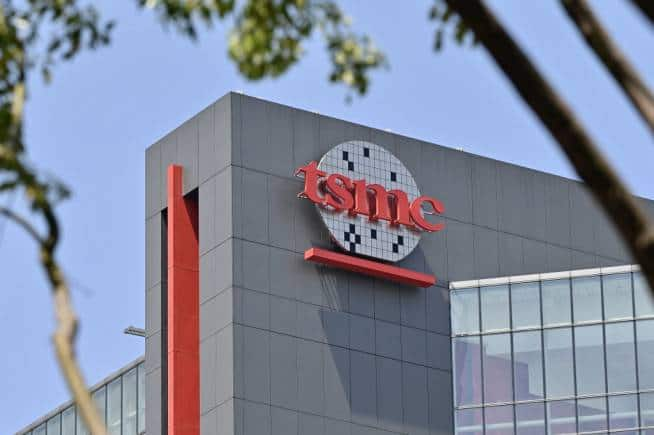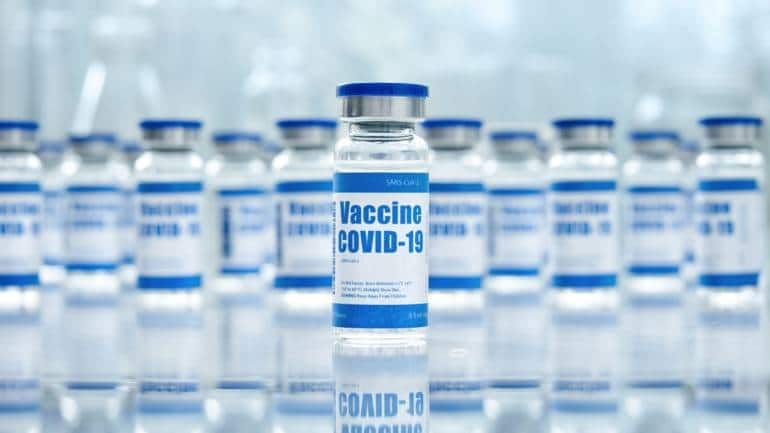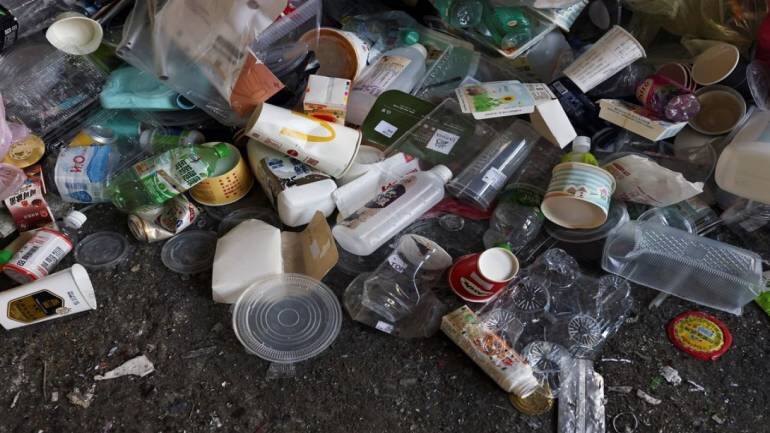Taiwan chipmaker TSMC says profit up 11.2% as demand rises
 ]
]
A factory of Taiwanese semiconductors manufacturer TSMC at Central Taiwan Science Park in Taichung (Image Source: Sam Yeh/AFP)
Taiwan Semiconductor Manufacturing (TSMC) on July 15 said its latest quarterly profit rose 11.2 percent over a year earlier to $4.8 billion as demand for smartphones and consumer electronics increased. It is the biggest contract manufacturer of processor chips for Apple Inc. and other global brands.
Sales in the three months ending June 30 rose 19.8 percent to $13.3 billion, said the company, headquartered in Hsinchu, Taiwan.
TSMC also said it expects faster growth as next-generation telecoms and computing generates demand for chips. A shift to working remotely in response to the coronavirus pandemic helped propel demand for communications technology.
The company, whose customers also include Qualcomm Inc., said in April it plans to invest $100 billion over the next three years to expand manufacturing and research and development.
Most semiconductors used in smartphones, medical equipment, computers and other products are made in Taiwan, South Korea and China. Shortages have cropped up as supply failed to keep up with demand.
TSMC operates a semiconductor wafer fabrication facility in Camas, Washington, and design centers in San Jose, California, and Austin, Texas.
It has announced plans to invest $3.5 billion in a second US manufacturing site, in North Phoenix, Arizona, as concern grows over heavy American reliance on Asian sources for high-tech components.
Japan to provide 1 million more COVID vaccine doses to Taiwan
 ]
]
So far, four COVID-19 vaccines have been given Emergency Use Authorisation (EUA) in India - AstraZeneca’s Covishield, Covaxin, Sputnik V and Moderna.
Japan will send a third batch of donated COVID-19 vaccines to Taiwan this week, Japanese Foreign Minister Toshimitsu Motegi said on Tuesday, in a further show of support for the Chinese-claimed island which is now ramping up inoculations.
Motegi told reporters that the AstraZeneca Plc shots would be sent on Thursday, which would bring the country’s total donations to Taiwan so far to almost 3.4 million doses.
The first batch was sent in June, followed by a second donation earlier this month. Taiwan’s Foreign Ministry expressed its thanks, especially at a time when Japan is facing its own serious coronavirus situation.
“The friendship between Taiwan and Japan is unwavering. The Foreign Ministry once again thanks our partners in freedom and democracy for their warm assistance and strong support,” it added. Taiwan has complained that Chinese interference blocked a deal earlier this year for it to get vaccines from Germany’s BioNTech SE, charges Beijing has denied, but since then donations have rolled in for the government.
Last month the United States donated 2.5 million Moderna Inc doses, while the Baltic state of Lithuania has pledged 20,000 shots of AstraZeneca’s vaccine. Taiwan is rapidly expanding its vaccination programme, though so far only around one-tenth of its 23.5 million people have received at least one of the two shot regimen. But the government has millions of doses on order.
COVID-19 Vaccine Frequently Asked Questions View more How does a vaccine work? A vaccine works by mimicking a natural infection. A vaccine not only induces immune response to protect people from any future COVID-19 infection, but also helps quickly build herd immunity to put an end to the pandemic. Herd immunity occurs when a sufficient percentage of a population becomes immune to a disease, making the spread of disease from person to person unlikely. The good news is that SARS-CoV-2 virus has been fairly stable, which increases the viability of a vaccine. How many types of vaccines are there? There are broadly four types of vaccine — one, a vaccine based on the whole virus (this could be either inactivated, or an attenuated [weakened] virus vaccine); two, a non-replicating viral vector vaccine that uses a benign virus as vector that carries the antigen of SARS-CoV; three, nucleic-acid vaccines that have genetic material like DNA and RNA of antigens like spike protein given to a person, helping human cells decode genetic material and produce the vaccine; and four, protein subunit vaccine wherein the recombinant proteins of SARS-COV-2 along with an adjuvant (booster) is given as a vaccine. What does it take to develop a vaccine of this kind? Vaccine development is a long, complex process. Unlike drugs that are given to people with a diseased, vaccines are given to healthy people and also vulnerable sections such as children, pregnant women and the elderly. So rigorous tests are compulsory. History says that the fastest time it took to develop a vaccine is five years, but it usually takes double or sometimes triple that time. View more Show
Taiwan’s own relatively small domestic COVID-19 outbreak has now generally been brought under control, though there remain sporadic community infections.
Taiwan’s COVID-19 curbs drive spike in food packaging waste
 ]
]
Source: Reuters
Taiwan has become inundated with waste after a surge COVID-19 cases prompted movement curbs that led to a spike in online shopping and food deliveries and that is threatening to set back efforts to reduce the consumption of single-use plastic.
Taiwan has been dealing with an outbreak of community COVID-19 transmissions since April after months of few domestic infections and has since mid-May been under curbs that limited personal gatherings and curtailed restaurants to take-out service.
Lin Yu-huei, head of recycling at Taipei’s Department of Environmental Protection, said the amount of discarded take-out containers in the capital Taipei between January and May increased by 85 percent compared to the same period last year.
Follow our LIVE blog for latest updates of the novel coronavirus pandemic
In May alone, Taipei produced 10.79 tonnes of recyclable waste versus 7.05 tonnes a year earlier, the environmental protection department reported.
COVID-19 Vaccine Frequently Asked Questions View more How does a vaccine work? A vaccine works by mimicking a natural infection. A vaccine not only induces immune response to protect people from any future COVID-19 infection, but also helps quickly build herd immunity to put an end to the pandemic. Herd immunity occurs when a sufficient percentage of a population becomes immune to a disease, making the spread of disease from person to person unlikely. The good news is that SARS-CoV-2 virus has been fairly stable, which increases the viability of a vaccine. How many types of vaccines are there? There are broadly four types of vaccine — one, a vaccine based on the whole virus (this could be either inactivated, or an attenuated [weakened] virus vaccine); two, a non-replicating viral vector vaccine that uses a benign virus as vector that carries the antigen of SARS-CoV; three, nucleic-acid vaccines that have genetic material like DNA and RNA of antigens like spike protein given to a person, helping human cells decode genetic material and produce the vaccine; and four, protein subunit vaccine wherein the recombinant proteins of SARS-COV-2 along with an adjuvant (booster) is given as a vaccine. What does it take to develop a vaccine of this kind? Vaccine development is a long, complex process. Unlike drugs that are given to people with a diseased, vaccines are given to healthy people and also vulnerable sections such as children, pregnant women and the elderly. So rigorous tests are compulsory. History says that the fastest time it took to develop a vaccine is five years, but it usually takes double or sometimes triple that time. View more Show
Much of that is single-use tableware, both paper and plastic, and that concerns environmentalists.
“We can’t go back to using single-use tableware every time there is an epidemic outbreak,” said Tang An, a campaigner at Greenpeace Taiwan.
“This would mean that all the past efforts at decreasing plastic waste would have been for nothing.”
New Taipei, the municipality surrounding the capital, had a 50 percent jump in recyclable waste in May versus a year ago, said Tang.
While single-use table ware and plastic items are banned in mall food courts and supermarkets, most small restaurants and beverage shops, who are also the biggest source of single-use plastic, are exempt from the policy.
Those are also the businesses who have seen the biggest increase in delivery orders.
Chef Pan Yen-ming at Taipei’s An-Nyeong Korean restaurant said he spent about T$20,000 ($713.75) on single-use tableware just in June, increasing his raw materials costs by up to 14 percent.
“I have to confess that I choose to close my eyes to this, I have to forward the social responsibility for this to others, pretending that I don’t know,” he said.
“If you don’t package the food in a beautiful way, no one will pay attention to you.”
Follow our full coverage of the coronavirus pandemic here